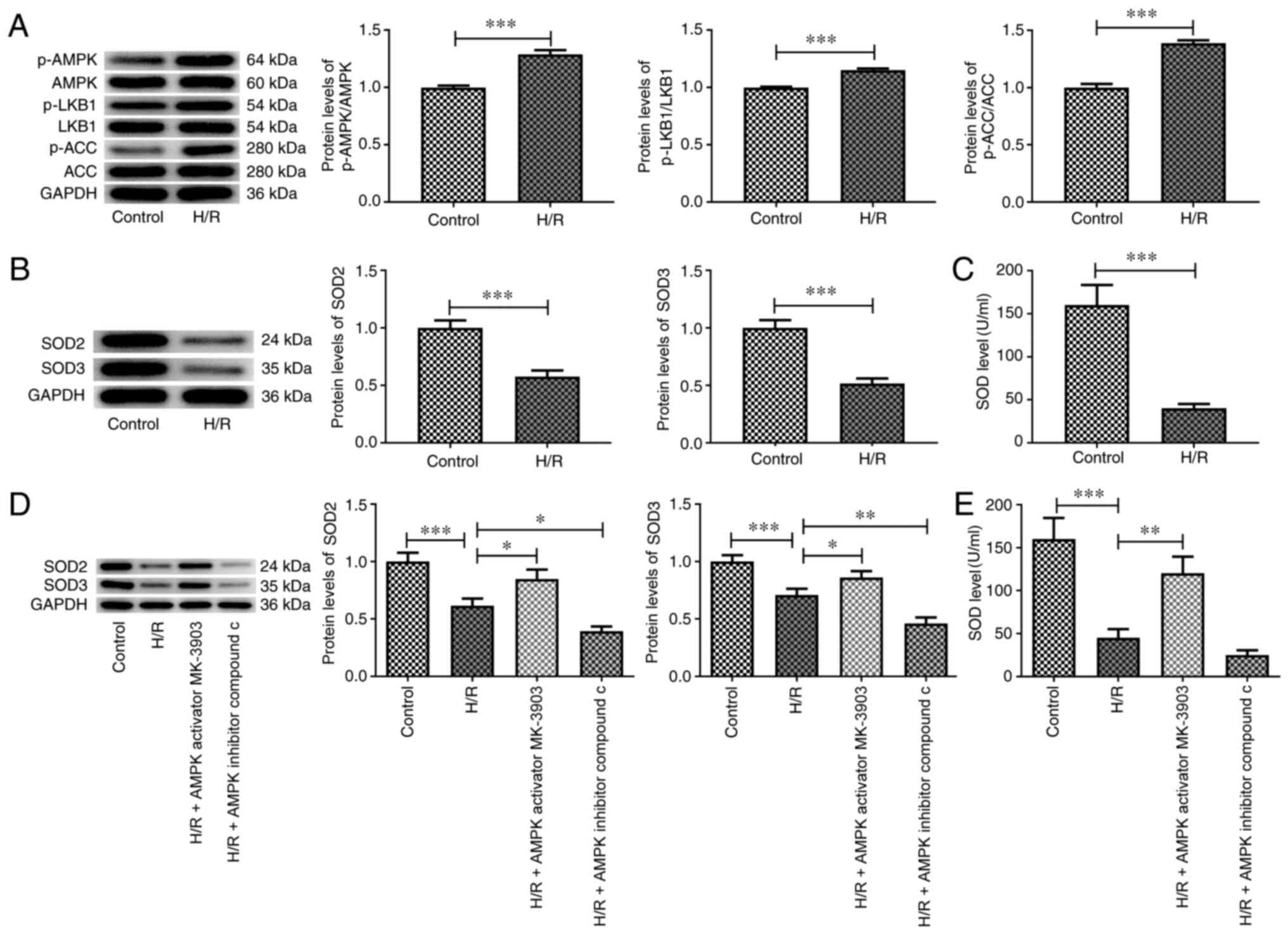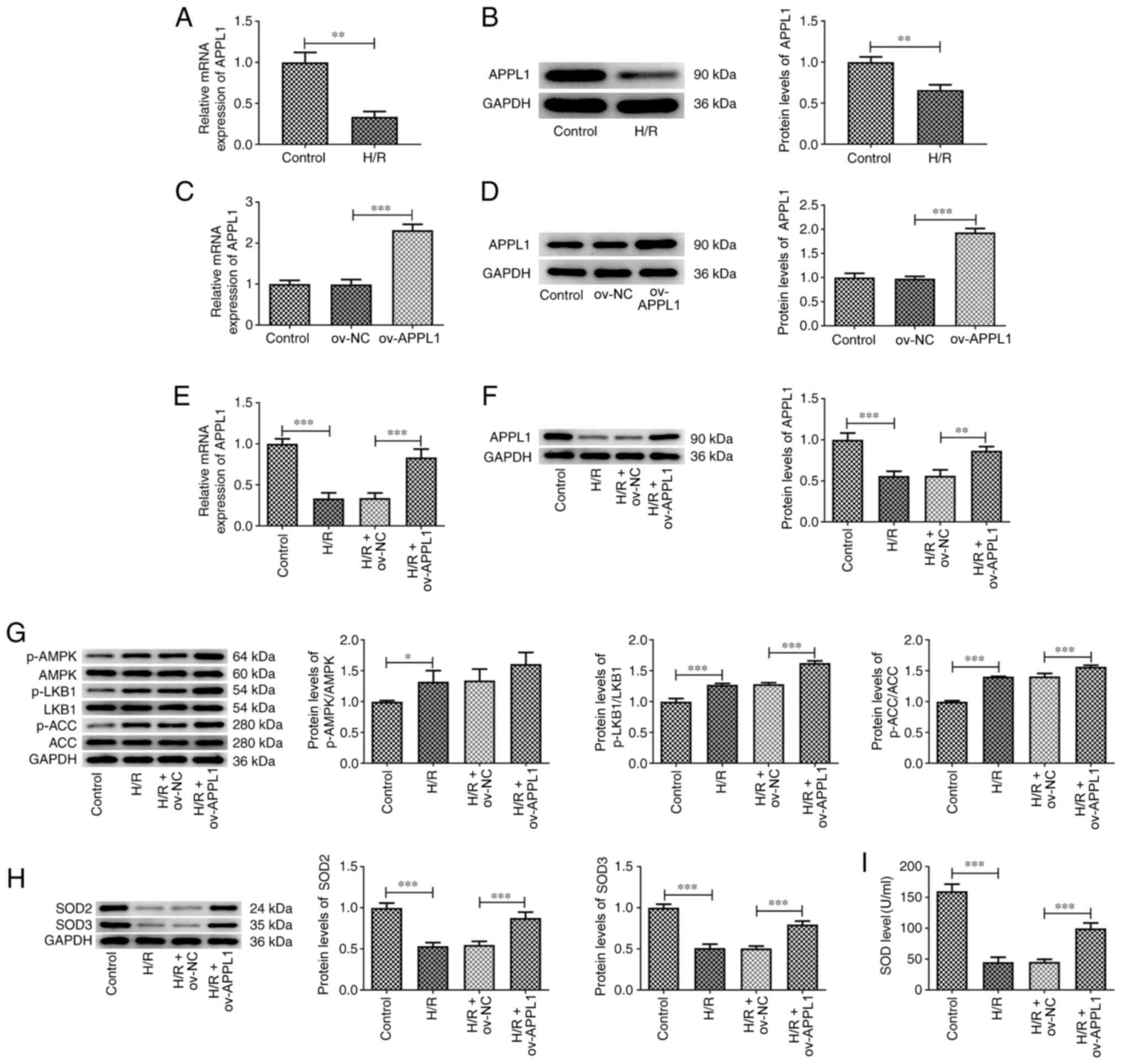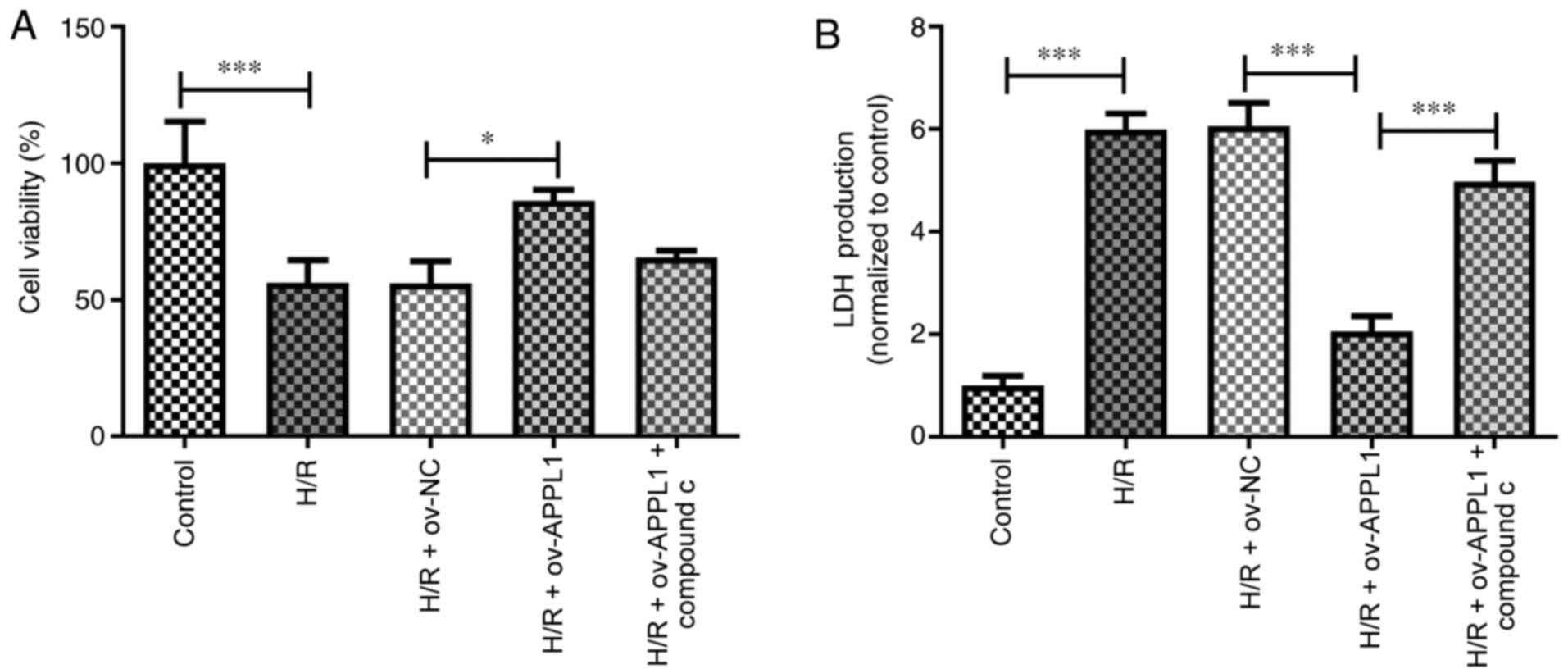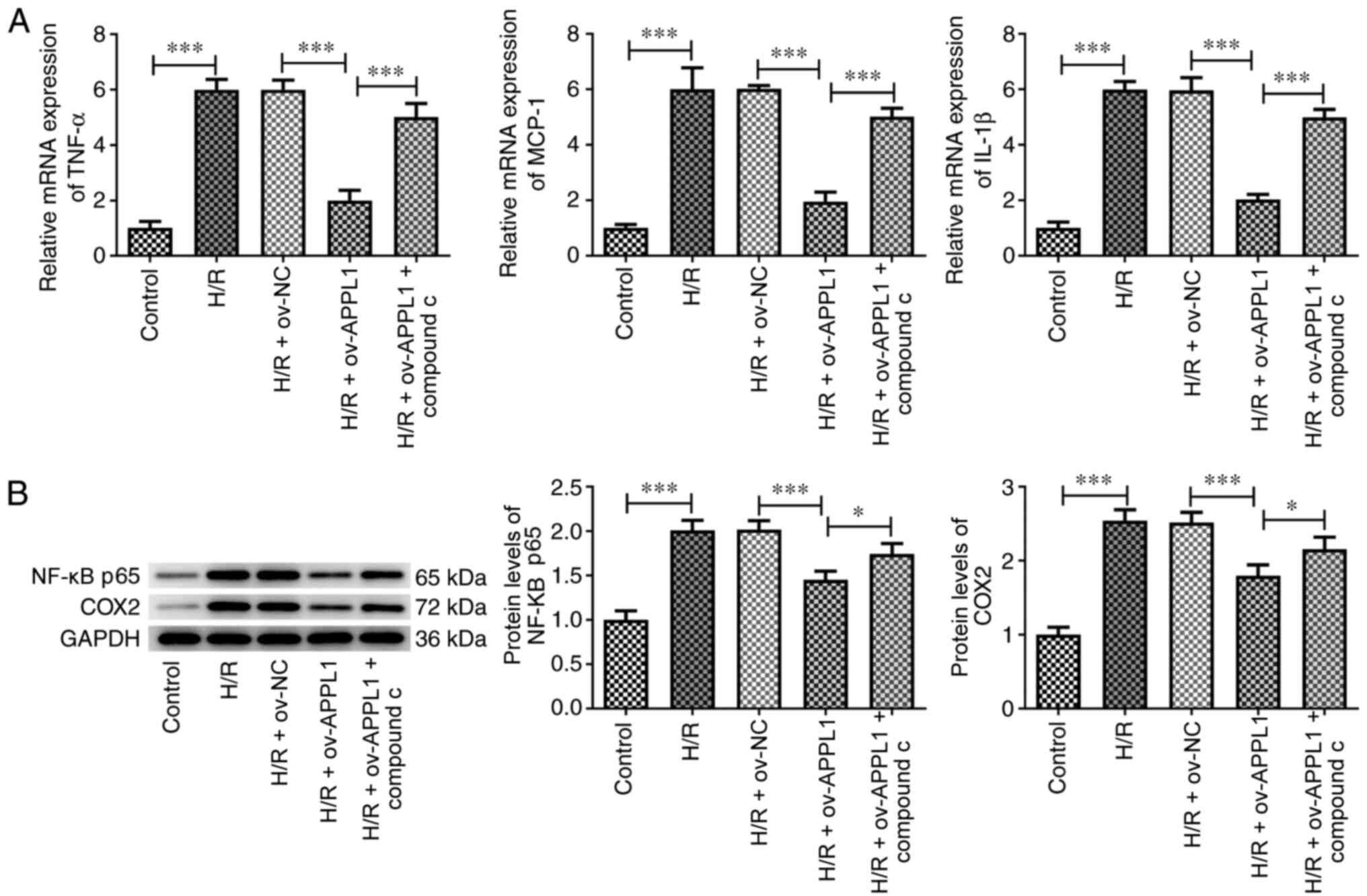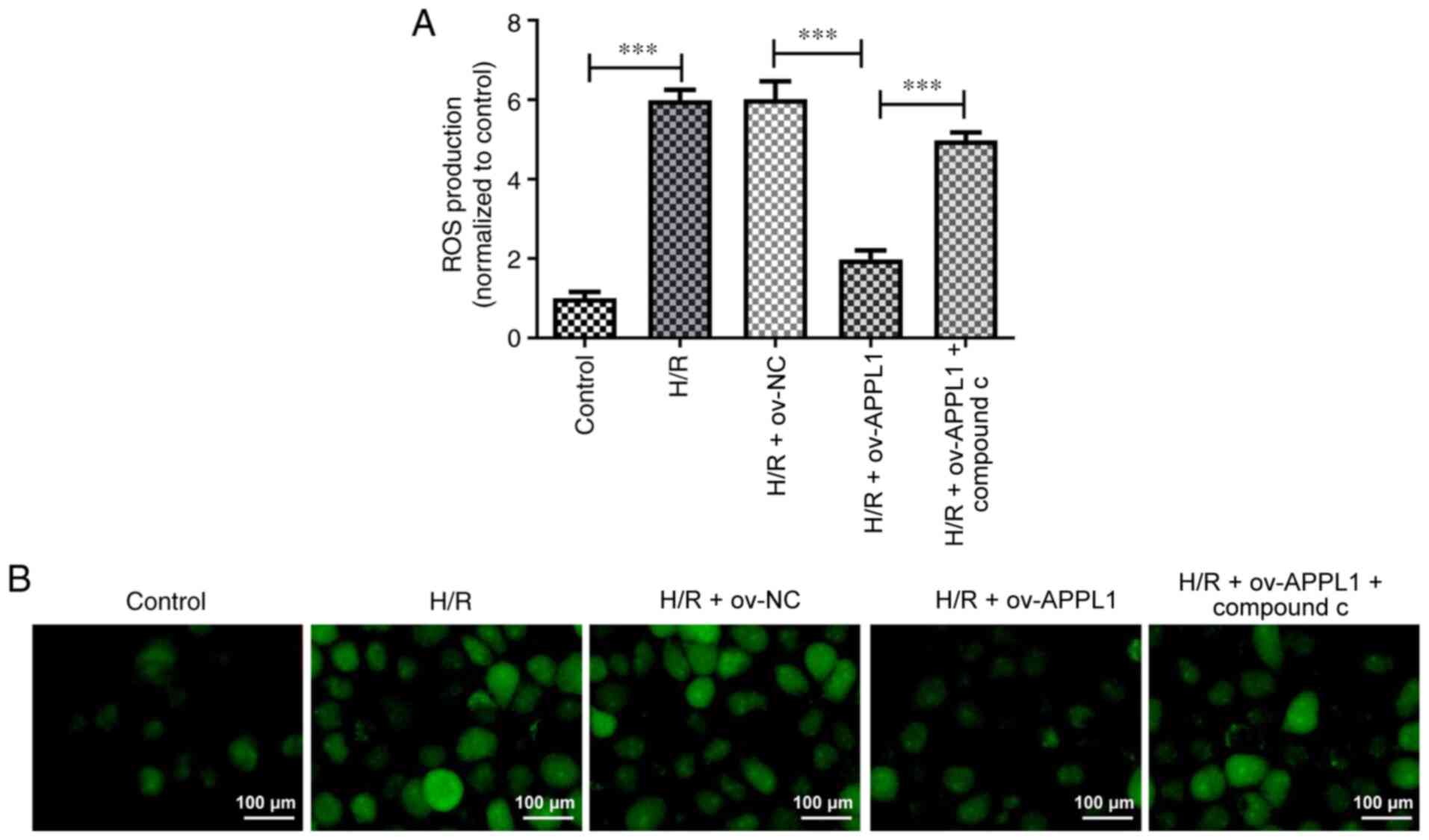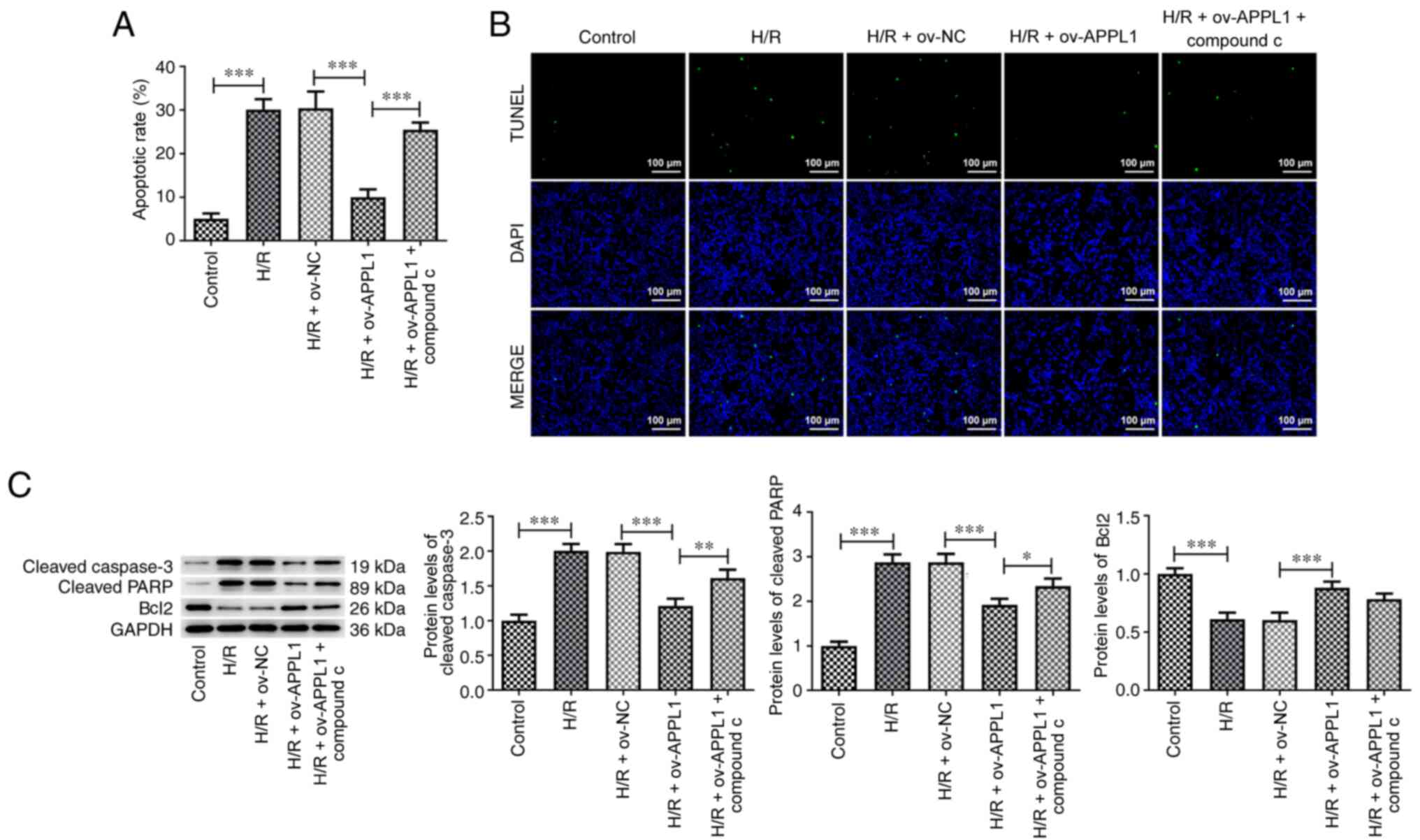|
1
|
Chi GC, Kanter MH, Li BH, Qian L, Reading
SR, Harrison TN, Jacobsen SJ, Scott RD, Cavendish JJ, Lawrence JM,
et al: Trends in acute myocardial infarction by race and ethnicity.
J Am Heart Assoc. 9(e013542)2020.PubMed/NCBI View Article : Google Scholar
|
|
2
|
Reed GW, Rossi JE and Cannon CP: Acute
myocardial infarction. Lancet. 389:197–210. 2017.PubMed/NCBI View Article : Google Scholar
|
|
3
|
Rout A, Tantry US, Novakovic M, Sukhi A
and Gurbel PA: Targeted pharmacotherapy for ischemia reperfusion
injury in acute myocardial infarction. Expert Opin Pharmacother.
21:1851–1865. 2020.PubMed/NCBI View Article : Google Scholar
|
|
4
|
Wu Y, Liu H and Wang X: Cardioprotection
of pharmacological postconditioning on myocardial
ischemia/reperfusion injury. Life Sci. 264(118628)2021.PubMed/NCBI View Article : Google Scholar
|
|
5
|
Chang JC, Lien CF, Lee WS, Chang HR, Hsu
YC, Luo YP, Jeng JR, Hsieh JC and Yang KT: Intermittent hypoxia
prevents myocardial mitochondrial Ca2+ overload and cell
death during ischemia/reperfusion: The role of reactive oxygen
species. Cells. 8(564)2019.PubMed/NCBI View Article : Google Scholar
|
|
6
|
Paradies G, Paradies V, Ruggiero FM and
Petrosillo G: Mitochondrial bioenergetics and cardiolipin
alterations in myocardial ischemia-reperfusion injury: Implications
for pharmacological cardioprotection. Am J Physiol Heart Circ
Physiol. 315:H1341–H1352. 2018.PubMed/NCBI View Article : Google Scholar
|
|
7
|
Ouchi N, Shibata R and Walsh K:
Cardioprotection by adiponectin. Trends Cardiovasc Med. 16:141–146.
2006.PubMed/NCBI View Article : Google Scholar
|
|
8
|
Feng Y, Lu Y, Liu D, Zhang W, Liu J, Tang
H and Zhu Y: Apigenin-7-O-β-d-(-6"-p-coumaroyl)-glucopyranoside
pretreatment attenuates myocardial ischemia/reperfusion injury via
activating AMPK signaling. Life Sci. 203:246–254. 2018.PubMed/NCBI View Article : Google Scholar
|
|
9
|
Liu Z, Chen JM, Huang H, Kuznicki M, Zheng
S, Sun W, Quan N, Wang L, Yang H, Guo HM, et al: The protective
effect of trimetazidine on myocardial ischemia/reperfusion injury
through activating AMPK and ERK signaling pathway. Metabolism.
65:122–130. 2016.PubMed/NCBI View Article : Google Scholar
|
|
10
|
Zhang Y, Wang Y, Xu J, Tian F, Hu S, Chen
Y and Fu Z: Melatonin attenuates myocardial ischemia-reperfusion
injury via improving mitochondrial fusion/mitophagy and activating
the AMPK-OPA1 signaling pathways. J Pineal Res.
66(e12542)2019.PubMed/NCBI View Article : Google Scholar
|
|
11
|
Cao C, Liu HM, Li W, Wu Y, Leng Y, Xue R,
Chen R, Tang LH, Sun Q, Xia Z, et al: Role of adiponectin in
diabetes myocardial ischemia-reperfusion injury and ischemic
postconditioning. Acta Cir Bras. 35(e202000107)2020.PubMed/NCBI View Article : Google Scholar
|
|
12
|
Fang H and Judd RL: Adiponectin regulation
and function. Compr Physiol. 8:1031–1063. 2018.PubMed/NCBI View Article : Google Scholar
|
|
13
|
Shibata R, Sato K, Pimentel DR, Takemura
Y, Kihara S, Ohashi K, Funahashi T, Ouchi N and Walsh K:
Adiponectin protects against myocardial ischemia-reperfusion injury
through AMPK- and COX-2-dependent mechanisms. Nat Med.
11:1096–1103. 2005.PubMed/NCBI View
Article : Google Scholar
|
|
14
|
Potenza MA, Sgarra L, Nacci C, Leo V, De
Salvia MA and Montagnani M: Activation of AMPK/SIRT1 axis is
required for adiponectin-mediated preconditioning on myocardial
ischemia-reperfusion (I/R) injury in rats. PLoS One.
14(e0210654)2019.PubMed/NCBI View Article : Google Scholar
|
|
15
|
Park M, Youn B, Zheng XL, Wu D, Xu A and
Sweeney G: Globular adiponectin, acting via AdipoR1/APPL1, protects
H9c2 cells from hypoxia/reoxygenation-induced apoptosis. PLoS One.
6(e19143)2011.PubMed/NCBI View Article : Google Scholar
|
|
16
|
Yi W, Sun Y, Gao E, Wei X, Lau WB, Zheng
Q, Wang Y, Yuan Y, Wang X, Tao L, et al: Reduced cardioprotective
action of adiponectin in high-fat diet-induced type II diabetic
mice and its underlying mechanisms. Antioxid Redox Signal.
15:1779–1788. 2011.PubMed/NCBI View Article : Google Scholar
|
|
17
|
Farías JG, Molina VM, Carrasco RA, Zepeda
AB, Figueroa E, Letelier P and Castillo RL: Antioxidant therapeutic
strategies for cardiovascular conditions associated with oxidative
stress. Nutrients. 9(966)2017.PubMed/NCBI View Article : Google Scholar
|
|
18
|
Kurian GA, Rajagopal R, Vedantham S and
Rajesh M: The role of oxidative stress in myocardial ischemia and
reperfusion injury and remodeling: Revisited. Oxid Med Cell Longev.
2016(1656450)2016.PubMed/NCBI View Article : Google Scholar
|
|
19
|
Gonçalves AF, Polegato BF, Fernandes AA,
Ishikawa LL, Okoshi K, Bazan SGZ, Minicucci MF, Azevedo PS, Ikoma
MR, Penitenti M, et al: Zinc supplementation attenuates cardiac
remodeling after experimental myocardial infarction. Cell Physiol
Biochem. 50:353–362. 2018.PubMed/NCBI View Article : Google Scholar
|
|
20
|
Yin H, Wu M and Jia Y: Knockdown of IL-32
protects PC12 cells against oxygen-glucose
deprivation/reoxygenation-induced injury via activation of
Nrf2/NF-κB pathway. Metab Brain Dis. 35:363–371. 2020.PubMed/NCBI View Article : Google Scholar
|
|
21
|
Sivandzade F, Prasad S, Bhalerao A and
Cucullo L: NRF2 and NF-қB interplay in cerebrovascular and
neurodegenerative disorders: Molecular mechanisms and possible
therapeutic approaches. Redox Biol. 21(101059)2019.PubMed/NCBI View Article : Google Scholar
|
|
22
|
Livak KJ and Schmittgen TD: Analysis of
relative gene expression data using real-time quantitative PCR and
the 2(-Delta Delta C(T)) method. Methods. 25:402–408.
2001.PubMed/NCBI View Article : Google Scholar
|
|
23
|
Zhao D, Sun Y, Tan Y, Zhang Z, Hou Z, Gao
C, Feng P, Zhang X, Yi W and Gao F: Short-duration swimming
exercise after myocardial infarction attenuates cardiac dysfunction
and regulates mitochondrial quality control in aged mice. Oxid Med
Cell Longev. 2018(4079041)2018.PubMed/NCBI View Article : Google Scholar
|
|
24
|
Wang X, Yang L, Kang L, Li J, Yang L,
Zhang J, Liu J, Zhu M, Zhang Q, Shen Y and Qi Z: Metformin
attenuates myocardial ischemia-reperfusion injury via up-regulation
of antioxidant enzymes. PLoS One. 12(e0182777)2017.PubMed/NCBI View Article : Google Scholar
|
|
25
|
Lv H, Liu Q, Wen Z, Feng H, Deng X and Ci
X: Xanthohumol ameliorates lipopolysaccharide (LPS)-induced acute
lung injury via induction of AMPK/GSK3β-Nrf2 signal axis. Redox
Biol. 12:311–324. 2017.PubMed/NCBI View Article : Google Scholar
|
|
26
|
Lv H, Hong L, Tian Y, Yin C, Zhu C and
Feng H: Corilagin alleviates acetaminophen-induced hepatotoxicity
via enhancing the AMPK/GSK3β-Nrf2 signaling pathway. Cell Commun
Signal. 17(2)2019.PubMed/NCBI View Article : Google Scholar
|
|
27
|
Guo W, Liu X, Li J, Shen Y, Zhou Z, Wang
M, Xie Y, Feng X, Wang L and Wu X: Prdx1 alleviates cardiomyocyte
apoptosis through ROS-activated MAPK pathway during myocardial
ischemia/reperfusion injury. Int J Biol Macromol. 112:608–615.
2018.PubMed/NCBI View Article : Google Scholar
|
|
28
|
Liu C, Tang M, Zhang X, Li J and Cao G:
Knockdown of miR-665 protects against cardiomyocyte
ischemia/reperfusion injury-induced ros accumulation and apoptosis
through the activation of Pak1/Akt signaling in myocardial
infarction. Int Heart J. 61:347–354. 2020.PubMed/NCBI View Article : Google Scholar
|
|
29
|
Yu J, Wang WN, Matei N, Li X, Pang JW, Mo
J, Chen SP, Tang JP, Yan M and Zhang JH: Ezetimibe attenuates
oxidative stress and neuroinflammation via the AMPK/Nrf2/TXNIP
pathway after MCAO in rats. Oxid Med Cell Longev.
2020(4717258)2020.PubMed/NCBI View Article : Google Scholar
|
|
30
|
Zhao Z, Tang Z, Zhang W, Liu J, Li B and
Ding S: Inactivated pseudomonas aeruginosa protects against
myocardial ischemia reperfusion injury via Nrf2 and HO-1. Exp Ther
Med. 19:3362–3368. 2020.PubMed/NCBI View Article : Google Scholar
|
|
31
|
Folmes CD and Lopaschuk GD: Role of
malonyl-CoA in heart disease and the hypothalamic control of
obesity. Cardiovasc Res. 73:278–287. 2007.PubMed/NCBI View Article : Google Scholar
|
|
32
|
Mu F, Duan J, Bian H, Zhai X, Shang P, Lin
R, Zhao M, Hu D, Yin Y, Wen A and Xi M: Metabonomic strategy for
the evaluation of chinese medicine salvia miltiorrhiza and
dalbergia odorifera interfering with myocardial
ischemia/reperfusion injury in rats. Rejuvenation Res. 20:263–277.
2017.PubMed/NCBI View Article : Google Scholar
|
|
33
|
Hu H, Li X, Ren D, Tan Y, Chen J, Yang L,
Chen R, Li J and Zhu P: The cardioprotective effects of carvedilol
on ischemia and reperfusion injury by AMPK signaling pathway.
Biomed Pharmacother. 117(109106)2019.PubMed/NCBI View Article : Google Scholar
|
|
34
|
Bae S, Park M, Kang C, Dilmen S, Kang TH,
Kang DG, Ke Q, Lee SU, Lee D and Kang PM: Hydrogen
peroxide-responsive nanoparticle reduces myocardial
ischemia/reperfusion injury. J Am Heart Assoc.
5(e003697)2016.PubMed/NCBI View Article : Google Scholar
|
|
35
|
Hadi NR, Al-Amran F, Yousif M and Zamil
ST: Antiapoptotic effect of simvastatin ameliorates myocardial
ischemia/reperfusion injury. ISRN Pharmacol.
2013(815094)2013.PubMed/NCBI View Article : Google Scholar
|
|
36
|
Chen X, Li X, Zhang W, He J, Xu B, Lei B,
Wang Z, Cates C, Rousselle T and Li J: Activation of AMPK inhibits
inflammatory response during hypoxia and reoxygenation through
modulating JNK-mediated NF-κB pathway. Metabolism. 83:256–270.
2018.PubMed/NCBI View Article : Google Scholar
|
|
37
|
Shen Y, Liu X, Shi J and Wu X: Involvement
of Nrf2 in myocardial ischemia and reperfusion injury. Int J Biol
Macromol. 125:496–502. 2019.PubMed/NCBI View Article : Google Scholar
|
|
38
|
Hou X, Fu M, Cheng B, Kang Y and Xie D:
Galanthamine improves myocardial ischemia-reperfusion-induced
cardiac dysfunction, endoplasmic reticulum stress-related
apoptosis, and myocardial fibrosis by suppressing AMPK/Nrf2 pathway
in rats. Ann Transl Med. 7(634)2019.PubMed/NCBI View Article : Google Scholar
|
|
39
|
Mo Y, Zhu JL, Jiang A, Zhao J, Ye L and
Han B: Compound 13 activates AMPK-Nrf2 signaling to protect
neuronal cells from oxygen glucose deprivation-reoxygenation. Aging
(Albany NY). 11:12032–12042. 2019.PubMed/NCBI View Article : Google Scholar
|
|
40
|
Wu WY, Li YD, Cui YK, Wu C, Hong YX, Li G,
Wu Y, Jie LJ, Wang Y and Li GR: The natural flavone acacetin
confers cardiomyocyte protection against hypoxia/reoxygenation
injury via AMPK-mediated activation of Nrf2 signaling pathway.
Front Pharmacol. 9(497)2018.PubMed/NCBI View Article : Google Scholar
|
|
41
|
Zhou F, Wang M, Ju J, Wang Y, Liu Z, Zhao
X, Yan Y, Yan S, Luo X and Fang Y: Schizandrin A protects against
cerebral ischemia-reperfusion injury by suppressing inflammation
and oxidative stress and regulating the AMPK/Nrf2 pathway
regulation. Am J Transl Res. 11:199–209. 2019.PubMed/NCBI
|















